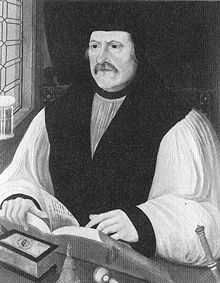Matthew Parker
Matthew Parker (born August 6, 1504 in Norwich , † May 17, 1575 in Lambeth ) was Archbishop of Canterbury (1559-1575) and reformer of England.
Live and act
He was born as the eldest son of William Parker and Alice. Monins born. His mother may have been related to Thomas Cranmer through a marriage in her relatives. After the death of William Parker, around 1516, his widow married John Baker, who became Matthew Parker's stepfather. Parker attended Corpus Christi College in Cambridge from 1522 . It is said that he was studying at the same time as William Cecil ; this seems unlikely, however, since Cecil was only two years old at the time. He finished his studies in 1525 and was ordained a deacon in April 1527 and a priest two months later.
In September 1528 he was elected a fellow of Corpus Christi College and took up a master's degree there again. He was one of the scientists at Cambridge who wanted to transfer Thomas Wolsey to his newly established "Cardinal College" in Oxford . Like Cranmer, Parker declined the invitation. In the meantime he was under the influence of the Cambridge Reformers, and after Anne Boleyn was recognized as Queen , he was appointed their chaplain. Through her influence he became dean of the college of the "secular canons" at Stoke-by-Clare in 1535 .
On August 1, 1559, Parker was elected Archbishop of Canterbury, but it proved difficult to find the necessary four bishops who could and would consecrate him, so that he was not accepted until December 19 by William Barlow , formerly Bishop of Bath and Wells, John Scory , formerly Bishop of Chichester, Miles Coverdale , formerly Bishop of Exeter, and John Hodgkins , Bishop of Bedford, was ordained in Lambeth .
Parker avoided getting involved in secular politics and never became a privy councilor under Queen Elizabeth . Church politics was also the cause of various difficulties for him. Some of the more Calvinist reformers called for changes in the liturgy and at least the option of not having to wear certain items of clothing.
Afterlife
The Archbishop went down in music history through Thomas Tallis ' Tunes for Archbishop Parker's Psalter . The third song from this collection, Why fum'th in sight , based on Psalm 2 , served the composer Ralph Vaughan Williams as a template for one of his most popular melodies, the Fantasia on a Theme by Thomas Tallis .
The Parker Library in Cambridge is also named after Matthew Parker.
Individual proof
- ^ Powicke & Fryde: Handbook of British Chronology. Second Edition, London, 1961, p. 211
Web links
| predecessor | Office | successor |
|---|---|---|
| Reginald Pole |
Archbishop of Canterbury 1559–1575 |
Edmund Grindal |
| personal data | |
|---|---|
| SURNAME | Parker, Matthew |
| BRIEF DESCRIPTION | Archbishop of Canterbury (1559-1575) |
| DATE OF BIRTH | August 6, 1504 |
| PLACE OF BIRTH | Norwich |
| DATE OF DEATH | May 17, 1575 |
| Place of death | Lambeth |
